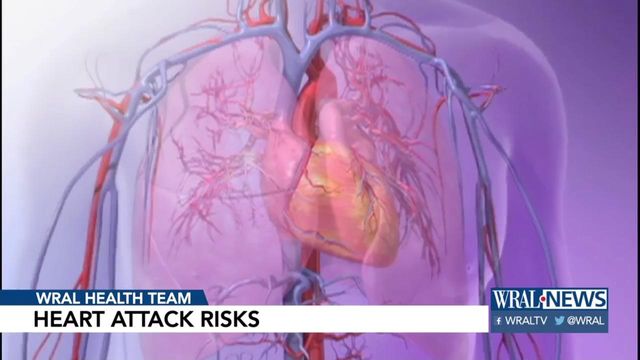Know your risk factors to reduce chance of heart attack
Heart disease is the No. 1 killer of men and women in the United States. Many people don't know they are at risk until serious symptoms occur, such as a heart attack or sudden cardiac arrest.
Posted — UpdatedMention heart disease, and most people picture a heart attack.
The term "heart disease" covers several conditions that can harm the heart and threaten your life.
Heart disease is the No. 1 killer of men and women in the United States. Many people don't know they are at risk until serious symptoms occur, such as a heart attack or sudden cardiac arrest. But there are ways to know your risk before it becomes an emergency.
Cardiovascular disease can begin with the buildup of plaque, which is the result of fat and cholesterol deposits that narrow heart arteries. Plaque makes it harder for blood to flow through.
That plaque can break off causing a clot that may block an artery.
That can starve a part of the heart muscle of oxygen and damage the organ, causing a heart attack.
Symptoms may include a dull or even squeezing sensation behind the breast bone nausea, vomiting, shortness of breath, cold sweat, fatigue and dizziness.
Women may often have non-classic symptoms, such as neck or jaw pain, and there may be pain radiating down the left arm. Some people experience a sense of impending doom.
UNC Rex Healthcare Cardiologist Dr. James Jollis says even if the symptoms seem mild, call 911.
"Only 2 in a 100 patients with any kind of chest symptoms are actually having a heart attack," Jollis said. "Two in a 100—the others 98 are not. So, we never mind being called. It's the only way to pick this up."
– Stress
Jollis says inexpensive tests can rule out or reveal problems.
"We often do electrocardiograms," Jollis said. "I think the cost is around $8 to $12. It's been around more than 100 years. It turns out it's a very helpful tool, and it's still the way we diagnose a heart attack."
A person suffering a heart attack is typically conscious, but with cardiac arrest, or sudden cardiac death, the person's heart simply stops, said WRAL Health Team's Dr. Allen Mask.
The person immediately collapses; they are unconscious.
Someone called 911.
Fortunately, there were people nearby who knew how to use emergency CPR, which can be done with chest compressions only.
The clubhouse even had an Automated External Defibrillator—or AED—with easy audible directions that can help you set it up and shock the heart to get it beating.
All these actions helped save the man's life.
To help prevent heart attacks, Mask says everyone should know their numbers: that is, making sure their blood sugar levels are within normal limits.
Many people are pre-diabetic or have diabetes and don't know it, so get blood sugar checked by your doctor.
At the same time, have your blood pressure checked. If it's too high, work with your doctor to get it under control. That may involve medications, but first, your doctor may recommend lifestyle changes.
That includes achieving and maintaining a healthy weight through healthier food and regular physical activity.
If you do smoke, quit
Also, if you have risk factors, talk to your doctor about taking a daily low-dose aspirin to prevent clots.
• Credits
Copyright 2024 by Capitol Broadcasting Company. All rights reserved. This material may not be published, broadcast, rewritten or redistributed.





